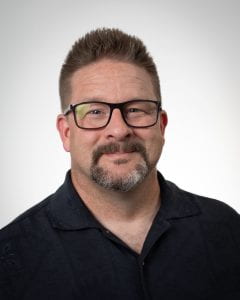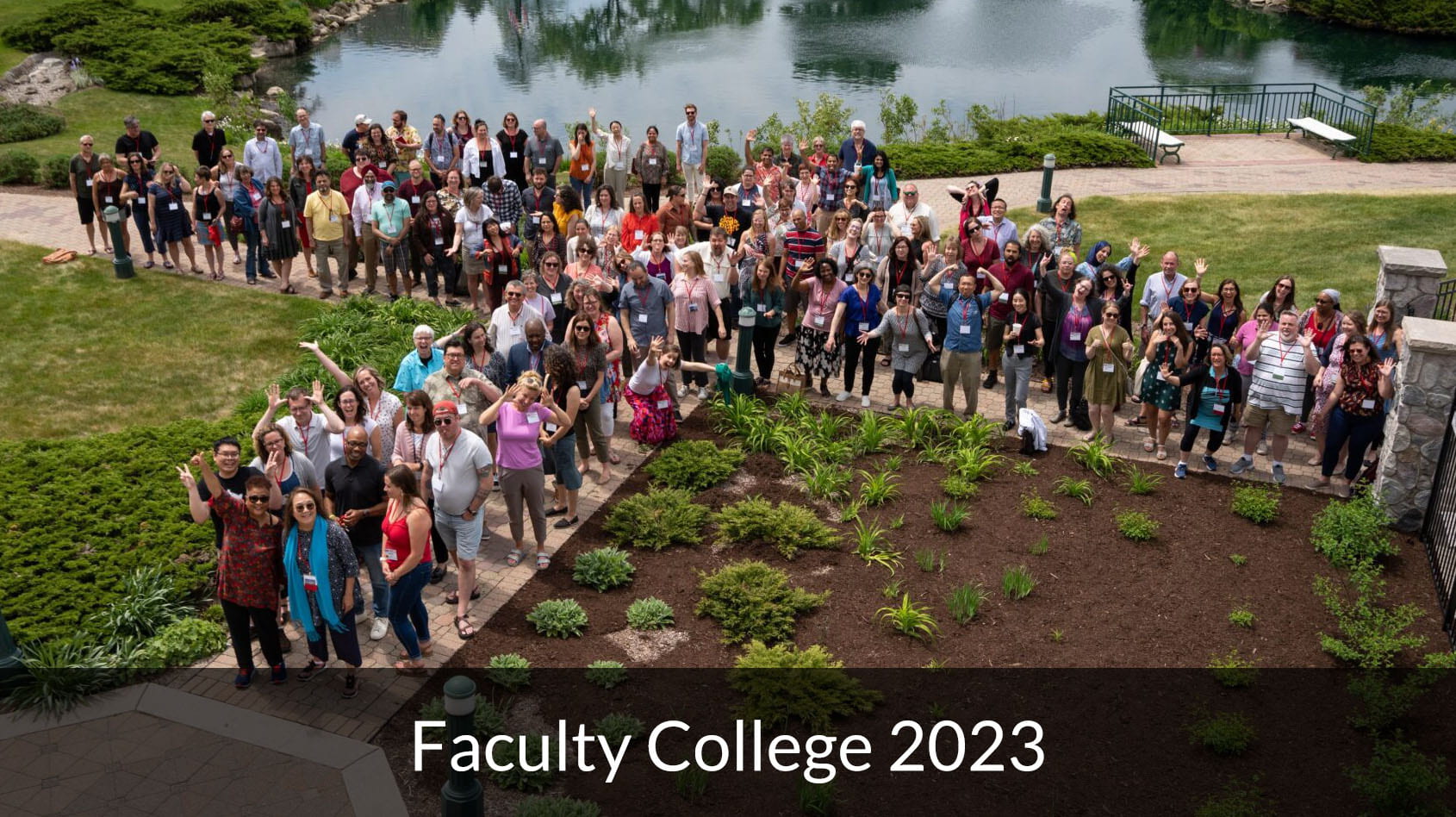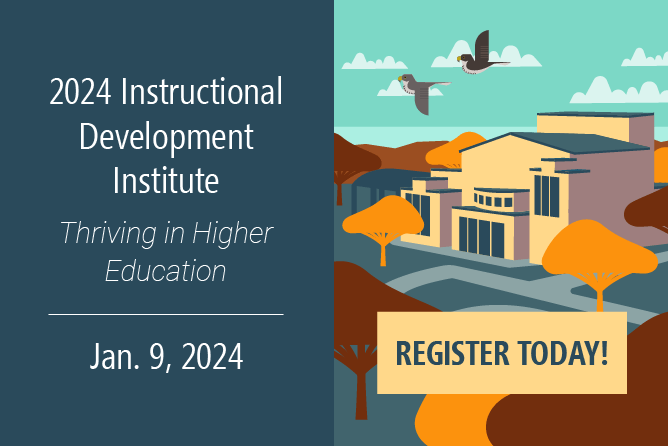Welcome to the UW-Green Bay Instructional Development Institute (IDI) registration and main information page! For quick access to conference details, use the table of contents below:
Conference Overview
The Instructional Development Institute will take place on Tuesday, Jan. 9, 2024, and is hosted by the Center for the Advancement of Teaching and Learning (CATL) and the Instructional Development Council. The 2024 IDI is a one-day, completely virtual and free teaching and learning conference that will feature live presentations by expert faculty, staff, and UWGB community members on the theme of “Thriving in Higher Education.” We are pleased to have Dr. Kevin Gannon as the conference keynote speaker, author of the book Radical Hope. In addition to his address on the conference topic, Dr. Gannon will lead two workshops, one focused on sustainable online teaching practices and the other centered on fostering belonging in both virtual and face-to-face learning environments. The 2024 IDI has concluded and registration is closed. Please contact CATL (CATL@uwgb.edu) if you have any questions about accessing recorded conference materials available in the 2024 IDI Canvas course.
About the Conference Theme: Thriving in Higher Education
Higher education has witnessed substantial challenges in recent years. Instructors and students faced COVID-19, the ensuing dramatic shifting to pandemic pedagogy, and all that came with it. Institutions confronted budget, enrollment, and political pressures, and they are now grappling with emerging generative AI technologies and their impact on education. Amid such disruptions, it can be easy to approach our work with a mentality of survival. This year’s Instructional Development Institute instead challenges you to consider what it would mean not simply to survive, but to thrive in higher education. While there are no easy answers, we can work together as educators to set goals, support one another, surmount obstacles, and achieve at a high level, similar to the expectations we have for our students.
Keynote Speaker

Dr. Kevin Gannon is Director of the Center for the Advancement of Faculty Excellence (CAFÉ) and Professor of History at Queens University of Charlotte, in North Carolina. He is the author of Radical Hope: A Teaching Manifesto (West Virginia University Press, 2020), and his writing has also appeared in The Chronicle of Higher Education, Vox, CNN, and The Washington Post. In 2016, he appeared in the Oscar-nominated documentary 13th, directed by Ava DuVernay. He is currently working on a project centered around reimagining introductory and survey courses in higher education.
Keynote Address: Hopeful Teaching in Less-Than Hopeful Times
Let’s not mince words: these are almost overwhelmingly difficult times to be in higher education. After (barely?) surviving multiple years of “pandemic pedagogy,” we find ourselves on a landscape marked by faculty burnout, student disconnection, fiscal shenanigans, and an external climate that seems to get more foreboding by the day. How, then, is it possible to bring any meaningful sense of hope to our work in teaching and learning? And how might we imagine a context where we’re not simply surviving, but where we and our students are actually thriving? This session will not claim to provide all the answers, nor will it simply throw out empty inspirational quotes like one of those motivational page-a-day calendars. Rather, we’ll focus on agency as a foundation for hopeful teaching, and consider the ways in which we might help our students discover, develop, and value their own agency as learners. In doing so, we’ll look at some promising strategies which evidence suggests will be helpful in this work. Participants will leave this session with specific ideas which they can incorporate into their own teaching.
Keynote Workshop: Sustaining Our Students and Ourselves in Online Teaching and Learning
This session will explore strategies by which we can make the workload involved in online teaching both manageable and sustainable. We’ll use the idea of “presence” from the Community of Inquiry framework as a way to interrogate our own practices and consider what alternatives might exist. We’ll then look at examples of tools and practices which can both enhance presence in our courses and make our workflow more manageable.
Keynote Workshop: (Re) Connecting with Students after “Pandemic Pedagogy”
One of the most prevalent observations from faculty in recent months has been how difficult it is to connect (or reconnect) with students since the disruptions of the pandemic. What are the reasons for this attenuated sense of connection? Why does engagement seem so difficult now? How do we deepen student engagement in our courses without adding unsustainable amounts to our workload? This session will explore the sources of this disconnect, and consider some specific ways in which we can foster meaningful engagement from students—with both course material and one another.
Schedule
LIVE SESSIONS
8:45 – 9:00 a.m. | Welcome & Land Acknowledgement
- Kate Burns (Provost and Vice Chancellor of Academic Affairs) and Kris Vespia (Center for the Advancement of Teaching and Learning Director)
9:00 – 10:00 a.m. | Keynote Address
- Hopeful Teaching in Less-Than-Hopeful Times
Dr. Kevin Gannon (Center for the Advancement of Faculty Excellence Director, Queens University)
10:15 – 11:00 a.m. | Session #1
Concurrent Session Options:
- Community-Based Learning: A Pillar of Thriving in College and Beyond
Katia Levintova (Professor), Isabel Gosse (UW-Green Bay Student), Ashley Heath (Academic Program Manager), Heather Kaminski (Assistant Professor), Grace Knudsen (Campus Compact AmeriCorps VISTA), Beth Kowalski (Director, Neville Public Museum), & Brady Reinhard (UW-Green Bay Student)
- The Role of Resilience in Non-Clinical Case Management at UW-Green Bay
Erin A. Van Daalwyk (Dean of Students) & Katie Morois (Assistant Dean of Students)
- Holistically Envisioning “Real-World” Applicability: A Conversation
David Voelker (Professor)
11:05 – 11:50 a.m. | Session #2
Concurrent Session Options:
- Trust No One: Implementing Information Literacy in a First-Year Seminar
Clifton Ganyard (Associate Professor) & Renee Ettinger (Assistant Director, Library Research Services)
- Thriving OER Projects at UWGB: A Roundtable Discussion
Carli Reinecke (OER Librarian), Joan Groessl (Associate Professor), Amy Kabrhel (Associate Professor), Kevin Kain (Teaching Professor), & Sawa Senzaki (Professor)
- The Myth of Standard Language Ideology: Language Inclusivity in the Higher Education Classroom
Cory Mathieu (Assistant Professor) & Shara Cherniak (Assistant Teaching Professor)
11:55 a.m. – 12:25 p.m. | Lunch
- Psychology and Stuff Podcast: Evidence-Based Strategies for Thriving in Academia
Alison Jane Martingano (Assistant Professor), Jason Cowell (Professor), Tom Gretton (Assistant Professor), Ryan Martin (Dean, College of Arts, Humanities, and Social Sciences), Abigail Nehrkorn-Bailey (Assistant Professor), Georjeanna Wilson-Doenges (Professor), & Chelsea Wooding (Assistant Professor)
12:30 – 1:30 p.m. | Keynote Workshop #1
- Sustaining Our Students and Ourselves in Online Teaching and Learning
Dr. Kevin Gannon (Center for the Advancement of Faculty Excellence Director, Queens University)
1:45 – 2:30 p.m.| Session #3
Concurrent Session Options:
- Foundations for the Thriving Student in the Age of ChatGPT
Jodi Pierre (Research Librarian) & Kristopher Purzycki (Assistant Professor)
- What the Health? Strategies to Thrive in the Stressful World of Higher Education
Jared Dalberg (Associate Professor)
- Slaying the “Techno-issue” Dragon
Vallari Chandna (Professor), Anup Nair (Assistant Teaching Professor), & Praneet Tiwari (Assistant Teaching Professor)
2:45 – 3:45 p.m. | Keynote Workshop #2
- (Re) Connecting with Students After “Pandemic Pedagogy”
Dr. Kevin Gannon (Center for the Advancement of Faculty Excellence Director, Queens University)
3:45 – 4:00 p.m. | Wrap-Up
- Kris Vespia (Center for the Advancement of Teaching and Learning Director)
ON-DEMAND SESSIONS
- Combining Engineering Ethics and Information Literacy in a STEM First-Year Seminar
Nabila Rubaiya (Assistant Teaching Professor) & Jodi Pierre (Research Librarian)
- Escape from the Chemistry Lab!
Breeyawn Lybbert (Associate Professor)
Institute FAQs
Q: What types of sessions does this conference include?
A: The 2024 IDI is completely virtual and will be held through a Canvas course. The conference will feature a keynote address and two workshops led by Dr. Kevin Gannon. In addition to Dr. Gannon’s sessions, attendees will also be able to engage with a variety of live and one-demand presentations hosted by UWGB faculty, staff, and community partners.
Q: How do I join the IDI Canvas course?
A: Everyone who registers for the conference will be sent an email on January 2, 2024, with a link to self-enroll in the IDI Canvas course. Follow the steps in the email to set up a Canvas account (if applicable) and complete the self-enrollment process. By joining the IDI Canvas course, you will have full access to all the live and on-demand sessions, materials, and discussions. If you have any issues joining the course, please contact us at CATL@uwgb.edu.
Q: What are the live sessions and how can I access them?
A: All live conference sessions will be hosted through Zoom and links to each individual Zoom session will be made available within the IDI Canvas course at 8 a.m. on Tuesday, January 9, 2024.
Q: What are the on-demand sessions and how can I access them?
A: In addition to the live presentations, you can also explore a mix of on-demand sessions from pre-recorded presentations, podcasts, and online resources that explore concepts in teaching and learning. These sessions will be available in the IDI Canvas course and can be accessed after the conference as well.
Q: Will the live sessions be recorded?
A: Yes, all live sessions will be recorded and posted in the IDI Canvas course after the conference. We will post an announcement in the course once all session recordings have been made available. You will be able to watch the recordings at any time up to a year after the conference date.
Q: I don't work at UWGB - can I still attend this conference?
A: Yes! The 2024 IDI is free and open to all educators in the UW system and beyond.
Q: I have a conflict on Jan. 9 - can I still register to get access to the recordings?
A: Yes, we welcome those who are unable to attend live on Jan. 9 to still register for access to the session recordings after the conference.




